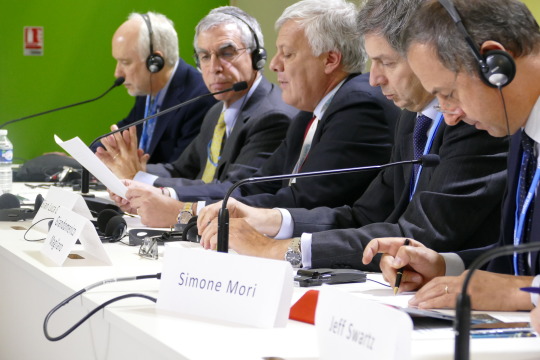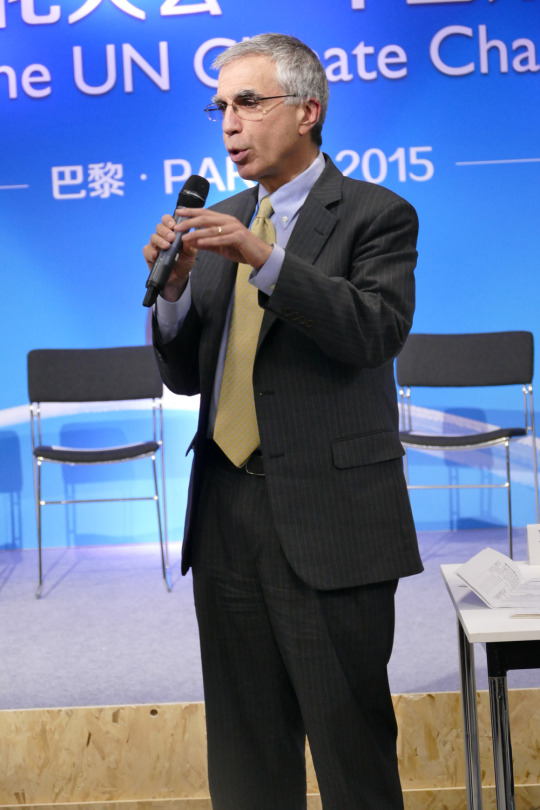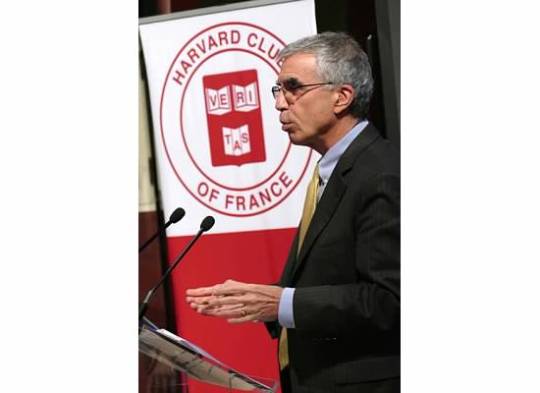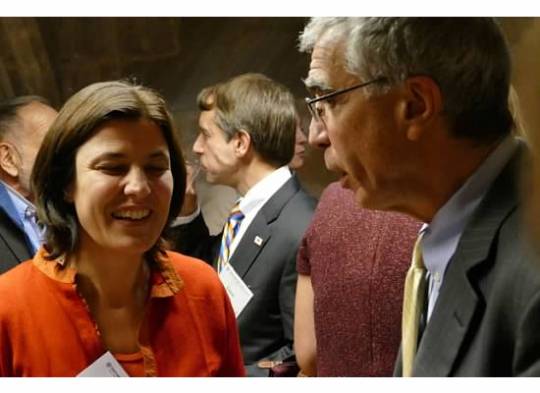Link
Professor Robert Stavins writes in The Conversation about the outcome of the U.N. Conference of the Parties (COP-21) in Paris.
0 notes
Link
To gain a greater understanding of the Paris Agreement, the Harvard Gazette spoke with Robert Stavins, the Albert Pratt Professor of Business and Government at the Harvard Kennedy School and head of the Harvard Project on Climate Agreements, who traveled to Paris and conducted briefings and side discussions for delegates from various nations.
1 note
·
View note
Link
An historic deal reached on Saturday (Dec. 12) at the Twenty-First Conference of the Parties (COP-21) in Paris may in the future be cited as the moment when the nations of the world finally reached concensus on the need to act on climate change. The accord represents a first step toward the goal of preventing global temperatures from rising more than two degree Celsius and requires mitigation actions by both developed and developing countries.
Robert Stavins, Albert Pratt Professor of Business and Government and faculty director of the Harvard Project on Climate Agreements (HPCA), is an environmental economist whose current research focuses on market based solutions to carbon emissions reductions. He led the HPCA team activities at COP-21 and provides his perspective on the agreement in his latest blog post, portions of which are featured in this article.
0 notes
Photo

Professor Robert Stavins (second from left) at the COP-21 panel, "Key Elements of the Paris Agreement and Implications for Business,” co-hosted by the Harvard Project on Climate Agreements and the Enel Foundation, December 9, 2015.
0 notes
Link
View a short video of highlights from the COP21 side panel, “The IPCC at a Crossroads: Enhancing the Usefulness of IPCC to the UNFCCC Process,” co-sponsored by the Harvard Project on Climate Agreements, December 9, 2015.
0 notes
Link
Harvard Kennedy School Professor Robert Stavins writes that the Paris Agreement “provides a broad foundation for meaningful progress on climate change and represents a dramatic departure from the Kyoto Protocol and the past 20 years of climate negotiations.”
0 notes
Link
More than 80 Harvard Kennedy School (HKS) alumni from throughout Europe, Asia and the Americas were treated to a lively discussion on climate change policy Tuesday night (Dec. 8) at Collège des Bernardins in Paris. The discussion, featuring Robert Stavins, Albert Pratt Professor of Business and Government, and respondent Gabriela Ramos MPA 1995, focused on COP21 and the potential for market-based solutions to address the global emissions problem.
0 notes
Link
Professor Robert Stavins of Harvard Kennedy School speaks with a television reporter about the work of the Harvard Project on Climate Agreements at COP21 in Paris, December 10, 2015.
0 notes
Link
The road ahead for climate change policy will entail many twists and turns, and the need for continuous rigorous and relevant climate science will be more important than ever. With that framing, a group of scholars on Wednesday (Dec. 9) shared their ideas for improving the process by which the Intergovernmental Panel on Climate Change (IPCC) carries out its research agenda, at a side panel at the U.N. climate change conference in Paris.
0 notes
Photo

HKS Professor Robert Stavins answering a question during U.N. Climate Change Summit side panel, “Implementing Paris Agreement: Innovation of Development Path” at China Pavilion, COP21, Paris, December 10, 2015.
0 notes
Link
The private sector – from large corporations to small businesses – will undoubtedly be impacted by whatever international agreement emerges from the U.N. Climate Change Conference taking place in Paris, but opinions vary as to how burdensome and costly those impacts will be. Participants in a side panel hosted on Wednesday (Dec. 9) by the Harvard Project on Climate Agreements (HPCA) at COP21, shared their perspectives on the most important challenges businesses will face post-Paris.
0 notes
Link
Ruben Lubowski PhD (Political Economy and Government) 2002, the Chief Natural Resource Economist at the Environmental Defense Fund (EDF), reflects on COP21 and his HKS education in an interview with Doug Gavel, Harvard Kennedy School Communications.
0 notes
Photo


"The Paris Conference and the Future of Climate Change Action,” featuring HKS Professor Robert Stavins and Gabriela Ramos MPA 1995, held at the Collège des Bernardins, Paris, France, December 8, 2015. The event was co-sponsored by the Harvard Kennedy School Office of Alumni Relations and Resource Development and the Harvard Club of France.
0 notes
Link
Giandomenico Magliano, the Italian Ambassador to France and a graduate of Harvard Kennedy School (MPA 1981), speaks with Doug Gavel, Harvard Kennedy School Communications, at the U.N. Climate Change Conference, COP21, in Paris France, on December 9, 2015.
0 notes
Video
Panelists, including HKS Professor Robert Stavins, gather for the COP21 side event, "Key Elements of the Paris Agreement and Implications for Business,” at the UN Climate Change Conference in Paris on Dec. 9, 2015
0 notes
Link
Negotiators at the U.N. Global Climate Change Summit in Paris are working toward a potential agreement to reduce carbon emissions during Week Two of COP21 in Paris. The Harvard Project on Climate Agreements (HPCA) is co-hosting a number of side events at the Summit, including one panel discussion on Wednesday (Dec. 9), "Key Elements of the Paris Agreement and Implications for Business," in which HKS Associate Professor Joseph Aldy will join by Skype. We asked Aldy to provide his perspective on the panel and on the prospects for a successful outcome in Paris.
0 notes
Link
The 195 national governments that are members of the United Nations Framework Convention on Climate Change (UNFCCC) are meeting in Paris to draft a major new agreement on climate change. They finished their first week of work on Saturday (December 5). This first week was technically a meeting of the Ad Hoc Working Group on the Durban Platform for Enhanced Action (ADP), a body organized under the UNFCCC’s Conference of the Parties (COP) to draft the new agreement. The ADP has now passed the baton to the COP, with the baton being a somewhat streamlined text of the agreement
0 notes